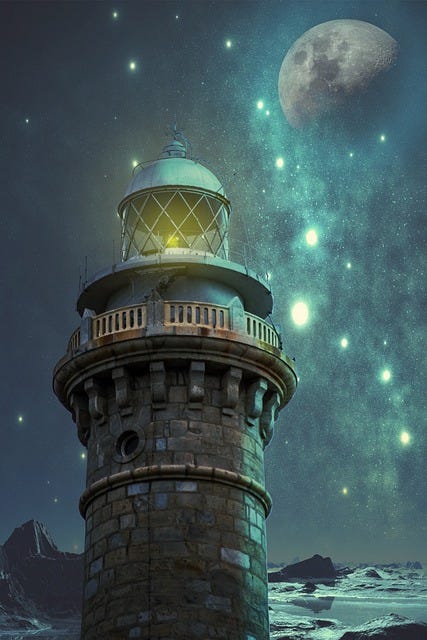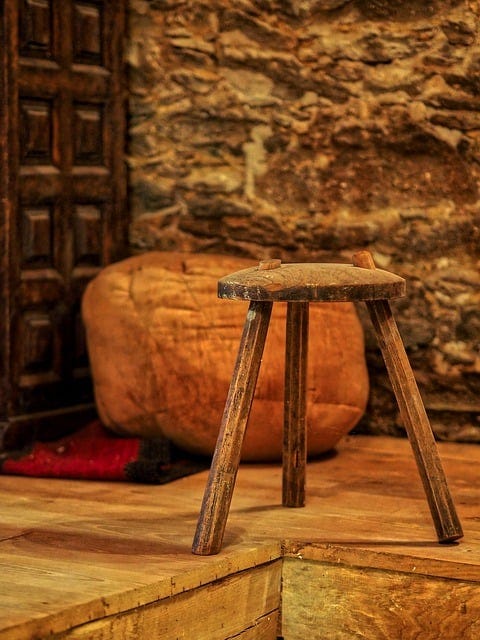(If you are a new subscriber, you might want to start at the beginning of the Webbd Wheel Series with The Hanged Man. If you would like to start at the beginning of The Tower, go here. If you prefer to read Parts 1 and 2 in their entirety, go here. For the next serial post, go here.)
CERUS
Cerus was born in a starry meadow of ebony. It was a slow, agonizing birth and he never knew the faces of his many mothers. They lived far away from the star fields, but they looked, and dreamed, and slowly Cerus emerged, rearing up from nothingness. His ruby eyes gleamed and glowed with bewildered anger. Marble horns sought something eternally out of reach. He strove with adamantine obsidian hooves to pull himself up and out, to stand, perhaps to move, but he could not.
He was not alone. One like those who birthed him stood before him. He had a flat dish of a face and stood on two legs. He held a round shining disc and menaced Cerus with a raised arm.
Behind this figure cringed another, a small creature on four legs, not daring to come too close but yapping hysterically, endlessly, until Cerus thought he would go mad. He longed to crush it beneath his feet, to toss it on his curved horns, to trample it and break it, quieting it forever.
But even as Cerus was trapped, so evidently were these others. Cerus glared. Two-leg threatened and the small one yapped, but none of them could move.
This was his life. Eternal silver light, a bloody haze of rage in his eyes, impotent strength in neck, chest, and hooves. Unseen, somewhere beneath his upper half, were powerful flanks and another pair of legs, and between those legs a center of power, a heavy, turgid, pulsing center he imagined blossomed with undulating color, like the luminescent clouds he could see in the endless darkness. It goaded him. It demanded…something. Yet he couldn’t move.
He could sense movement somewhere. Something moved. Was it he, after all? Or was it something around him?
He couldn’t tell. It further goaded him, not understanding, not seeing. But he thought he discerned movement, agonizingly slow and far away. Points of light and color moved in some kind of complex pattern — didn’t they? He saw another kind of movement, too, a sudden silver flash arcing across the blackness in cold white fire and then disappearing, swallowed up. His body was made of many such white points of light, but they didn’t move. How was it done? What was the secret?
Why must he bear such a life? What was he for?
Then, one day, something was different.
He couldn’t say what. There was no air, and no scent. The silent starry fields hadn’t changed. He could still feel his eyes glimmer and shine. Two-legs threatened, just as he always had done, and the small one yapped and yapped without ceasing.
Slowly, he realized it was his horn.
Something different about his horn.
But he couldn’t tell what.
Frustration boiled within him and he snorted, producing steamy wet vapor. He strained with all his might, as he had for eons, trying to pull himself out of the dark and onto the starry plain.
Suddenly he felt a hot slash of pain. It raked some unseen part of him hidden in darkness. It opened him. He felt agony. He roared in protest, tossed his horns and kicked, a scarlet net of rage running through his cool dark body with its silver outlines. Rage dripped down his flank, hot and corrosive. He bellowed again, kicked, the fabric of darkness tore, and he floated.
He moved away from two legs. Cerus imagined he’d seen an astonished look on his face as he floated away. The sound of the yapping creature disappeared, swallowed by the dark. Now Cerus could hear a slow rustling, infinite voices murmuring, but he only just heard it, like one hears one’s own heartbeat alone in the dark.
He was free. He moved. He bellowed again, this time in jubilation. Some part of his body burned with pain, but he didn’t care. Something was happening at last.
He saw the whole sky for the first time. The enormity of it! The endless depths of it! He moved through colored clouds of shining green, blue and red. He saw milky spirals and hazy silver clouds, stars like eyes so bright he couldn’t look at them. The sky was filled with jewels.
Cerus began accelerating. Floating became falling. He looked down -- he could bend his neck and look down! -- and saw a perfect round blue and white sphere, growing larger by the minute. He fell into it. It filled his vision. His icy blood boiled. He shut his eyes against the sandpaper friction of the air. He bawled, protesting, thrashing his hooves. He fell through something wet and cold and opened his eyes in surprise. He could see nothing but grey around him. He fell through it helplessly. Then below, far, far below, he saw a moving mass of — something. It stretched on and on, a writhing blue grey carpet, and he fell toward it.
It felt cold, and it burned like fire on the place where he’d been hurt. He opened his mouth to bellow his outrage and choked on some unbreathable substance surrounding him, pushing and pulling, slapping at him. He found nothing beneath him, no fixed point anywhere, and he couldn’t breathe. He kicked, panicked, and thrashed awkwardly with his new-found back end.
Something nudged him. He turned his head and saw a smooth long nose, a friendly-looking dark eye and a smiling face. The creature’s long body had flaps of skin and a tail. It moved under him, supporting his body so his head stayed above the water. Cerus shook his head, coughing and choking, and took a breath. The creature rubbed against him, first one side and then the other, in a comforting sort of way. Cerus’ panic receded slightly. All about him was restless movement, and the wet stuff slapped him over and over again, filling his mouth and stopping his breath. Everything was dim and dark and confusing. He could see no stars, no colored clouds. His body felt heavy and cumbersome.
The strange creature stayed with him, making no noise but frisking alongside or underneath him, pushing and nudging with its long smooth nose. It smiled and smiled, its expression unchanging. Cerus felt colder and colder. The cold sapped his strength until he moved only feebly, twitching his legs and concentrating on keeping his head up so he could breathe.
Then, ahead, he saw something, a tall dark something. The sound changed. He heard a roar and hiss rather than the endless slap, slap he’d been hearing. He realized he could see more clearly. The sky no longer looked black, but grey and silver. The creature with him pushed him toward the roaring and the tall darkness.
Exhausted, numb with cold, bewildered, Cerus was nudged helplessly ahead, until suddenly his feet bumped against something and he realized he could stand, actually stand on all four legs! Still, the stuff around him pushed and pulled at him so he staggered, but in a few steps more of his body emerged from it. The creature skimmed once again along his flank and left him, saluting him with its tail as it dove into a moving wall of what he’d been in. Doggedly, Cerus pulled himself forward until he stood, shivering, on solid rocky ground.
PERSEPHONE
Rapunzel and Persephone fitted themselves into a shared life in the tower in a surprisingly short time. Persephone had promised herself when she reached the tower she would go to bed, pull the covers over her head and stay there for as long as she wanted in peace and privacy, but she forgot about this when Rapunzel came down the stairs the first morning with a cheerful “Good morning! Let’s see about the light, shall we?”
After breakfast, they climbed to the tower’s top and discovered the lightkeeper had used a coal fire and mirrors.
“Messy and complicated,” said Rapunzel. “We can do better than this.”
Witchfire was undoubtedly cleaner and easier, and both women worked with a will, polishing windows and mirrors and scrubbing greasy soot from the stones. Later, Persephone found instructions for manipulating the mirrors and keeping the fire burning on the lightkeeper’s desk, and marveled at the patience and determination such an isolated, lonely and physically taxing job required.
It was a desolate place, and Persephone admitted to herself she felt glad for a companion. She knew harvest was in full swing, but here Fall was harsh, stony and sullen. Fog often swathed the lighthouse, and even on sunny days the tower felt chilly and clammy. The sea beat ceaselessly against the stone cliffs, throwing up freezing spray in huge plumes during stormy weather.
On tranquil days, it was possible to make one’s way down to the sea, but the path became dangerous when the rocks were wet and the waves greedy.
Rapunzel was fearless and exulted fiercely in wild weather, undaunted by slashing rain and wind and the sea’s roaring. But Persephone was made for milder climes. She’d not seen a winter in the Green World since she became Hades’ queen, and this place lay far from the abundant fields and forests where she’d grown up.
She’d imagined relaxing into solitude and grief at the tower, but she found grief is not a soothing companion. When the sun shone, even fitfully, she wrapped herself warmly and went out, walking inland and exploring the harsh seacoast.
The place had an austere beauty. No trees grew here, only scrubby, tough plants where enough soil collected to support them. During the years, wind and weather had exposed and carved the rock, and she discovered a landscape of fissure and plane, layer and chip and crack, sand and stone and shell.
The honesty of stone comforted her. It could be shaped into walls, stairs and shingles. It could be worn away by water, wind and weather. But it didn’t pretend to be something else. If she moved carelessly and stubbed a toe, or bruised her flesh, or lost her footing and tore a nail against the unyielding stone, nothing softened the hurt. She meant nothing to the stone, as she meant nothing to the sea. They didn’t need her. She made no impression on them.
The tower’s stone, polished by the wind’s grey wings and the iron salt sea, had faces.
In her bedroom wall, a block of stone with a slightly protruding rounded side showed crystals the color of wine. The protrusion wasn’t polished, exactly, but it looked deliberately exposed, as though the stonemason subtly underlined it. It made Persephone think of the Underworld with unexpected painful longing, and she wondered for the first time who had built the stone tower.
In other places the stone blocks making up the walls appeared to have been deliberately split in such a way that a lacy veining of white showed, or a fossil of some graceful water plant, or a cluster of spiral shells.
In the cliffs, too, she found plant, shell and even fish fossils. Metallic veins gleamed, even under grey skies, like frozen silver and gold lightning.
When she mentioned her growing fascination, Rapunzel showed her a stone in her own bedroom with a ghostly imprint of a bird’s wing, and another over the bed of a carved face. Persephone told Rapunzel what she knew about the Dvorgs and Dwarves. Rapunzel had known a Dwarve, Rumpelstiltskin by name, and one story led to another. The two women developed a habit of sitting before the stove after their evening meal telling stories, as they’d done at Rowan Tree.
As they shared memories of the Rowan Tree community and pieces of their lives with each other, Persephone dropped her guard slightly, but the loss of her child still stood between them like a cold wall. Persephone didn’t speak of Hades and her time as Queen of the Underworld, but of her childhood, the barn and horses, and the halcyon, innocent years with her mother, Demeter.
RAPUNZEL
Rapunzel filled her days with the weather, the sea, the wind and the light at the tower’s top. The light itself required little effort, except creating it at dusk or in case of poor visibility and extinguishing it at dawn. It burned clear and bright, once they scrubbed away grease and soot from burning coal. Adjusting the mirrors needed some skill, but she soon learned the hang of it, and the safe passage of occasional passing ships rewarded her.
Rapunzel felt at home in her tower and cherished her high room with its cushioned window seat, a perch from which to watch the ever-changing sky and sea. She often thought of Heks, Cassandra and the others she’d known at Rowan Tree. She wondered sometimes what would come next; where she would go and what she would do, but for now felt content to be still and keep the light burning. She’d been locked in a tower before, and found the key to freedom. Now she knew she couldn’t be trapped forever. She watched Persephone without appearing to, hoping with time Persephone would speak of whatever had hurt her and begin healing.
She turned away from thoughts of Dar. She’d been momentarily attracted, but chosen not to act on it. That was all. A good thing, too, as it turned out. No point in getting attached to a man who was about to die. Much better to remain free and independent. If Heks was right, and Dar, Lugh and Mary were tied to a greater cycle, their lives were bigger than any momentary attraction or passion. She felt impotent before that kind of power, and Rapunzel didn’t like to be impotent. She liked to be in control.
Though she held herself open, Rapunzel could find no whisper of anything wrong in the natural world. Heks’ talk of Yrtym made intuitive sense to her; naturally life would be connected by some kind of underlying pattern and intelligence. She wondered, though, why her mother had not shared knowledge of this hidden web and its name. Perhaps she’d not known.
In fact, the only voice Rapunzel really heard was the tower itself, or more specifically, the stone from which it was made. As Persephone told her about the Dvorgs and Dwarves, Rapunzel suspected they built the lighthouse. Only true masters and artists, deeply connected to stone, could create such natural beauty. Love and pride were evident in every block, and she and Persephone constantly discovered new wonder in the stone faces.
One misty day during which Rapunzel left the light burning to warn ships, she tackled the rough, wide-planked floor with a wet broom and discovered a trapdoor in the shadows under the stone steps winding up the tower. She set the broom aside and called Persephone.
A keyhole lay in the middle of an iron ring nestled flush with the floor’s surface. Rapunzel extracted the jeweled key Baba Yaga had given her from a tiny pocket she’d sewn inside her tunic. She had no doubt it would fit the keyhole, and it did. Persephone arrived as she pulled up the iron ring, and the heavy door rose soundlessly. Rapunzel noted a smooth, worn place on the stone wall where the heavy slab could be safely left propped open at a wide angle, to avoid it accidentally falling. Stone steps, like those in the rest of the tower, descended into darkness filled with the sea’s smell and sound.
Persephone took the lantern from its place on the kitchen table, lit it, and the two women descended cautiously into a stone cellar.
The builders had combined massive stones with the cliffs themselves to create a perfectly level and immensely strong foundation. In the floor they found a roughly round opening like the mouth of a well, about six feet across. Persephone held the lantern above the opening. They could see water, not still and stagnant, but living water moving and gleaming in the lantern light several feet below the lip.
“It’s the sea,” said Persephone. “There must be a passage through the cliff. Look, there are steps down there.”
There were. Steps exactly like those in the lighthouse curved up along the sides of the opening from below water level.
“Do you think it’s a portal?” Rapunzel asked.
“I don’t know. It looks as though it might be. I don’t much feel like testing it out.”
“No. Me, neither.”
Persephone raised the lantern and turned slowly, examining the rough walls. Down here, no effort had been made to build a smooth circular shape. The natural cliffs and quarried stones were expertly fitted, providing a level foundation of no particular shape. Niches and protrusions threw strange shadows. The sea roared and surged against the cliffs outside.
“What’s that?” The lantern light had picked out a silvery gleam on a wall. They walked toward it, giving the pool a wide and careful berth.
The end of a stone block, four feet high and wide, protruded from the cliff, making a ledge. On this lay large, bowl-like shells piled with pearls, coral, small stones and shells, and white fragments and pieces of material Rapunzel recognized as bones when she fingered them. A mortar and pestle lay near a pile of grit or sand, and a burned, blackened spot on the rock, as though someone had lit a small fire. Wood scraps and fabric lay about, along with a small knife.
On the nearby wall they found a mural. A boat with sails of coarse linen sailed on silvery waves, curved like the birds above. Under the boat and below the waves were the flowing, organic shapes of plants, pearl and silver dolphins with shining black eyes, merfolk with tails sparkling with jewels. A pack of what looked like dogs raced along the wave tops as though escorting the sailing ship.
“Who made this?” Rapunzel asked in wonder. “I’ve never seen anything like it. Was Irvin an artist?”
“He loved stories and words, but he didn’t talk about anything like this,” said Persephone. “Look, it’s made with some kind of cement, like the Dvorgs use. It reminds me of their work, but I’ve never seen them use pearls and coral. They have no access to such material.”
“Maybe a Dwarve?”
Persephone shook her head. “I don’t know.”
“Look.” Rapunzel picked up a bundle of neatly folded linen towels and robes from another ledge. “And here are lanterns and candles.”
“What does it mean?” Persephone asked.
“It means someone uses this place, probably someone from the sea. Maybe someone connected to Irvin.”
“Do you think whoever it is has come since we’ve been here?”
“Who knows? We haven’t been here long. I don’t much like the idea, but I can’t believe anyone evil did this kind of work. There’s no bolt or lock on the trapdoor, so Irvin obviously had no fear.”
“Maybe he didn’t know about this. It’s easy to miss the trapdoor.”
“Maybe he didn’t. But someone knows about it, obviously,” said Rapunzel. She wondered if Heks had known, if the well-like pool and whoever used it was part of why she’d been sent to the lighthouse.
“What should we do?” Persephone asked.
“Nothing. Wait and see.” She laid the bundle where she’d found it and they climbed the stairs. Rapunzel lowered the trapdoor and stood, looking thoughtfully down at it, while Persephone blew out the lantern and returned it to the table.
“Let’s put a stone on it for now,” she said. “At least that will make a noise and warn us if someone tries to lift the door. Brrr. It’s a raw day What would you say to a bowl of soup?”







